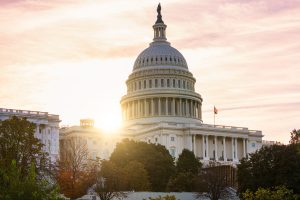NEW YORK — Eleven years ago, then-Representative. Marsha Blackburn (R-TN) praised Taiwan’s economic transformation, calling the island a hub for Asia’s technology sector.
By 2024, Blackburn, now a U.S. senator, was framing Taiwan as a security partner against authoritarian powers, stressing the importance of “standing with our allies like Taiwan and assist them as we stand up to what I call the ‘axis of evil’ – Russia, China, Iran, and North Korea.”
An analysis of 20 years of congressional speeches shows that support for Taiwan is increasingly a central pillar in the United States’ ideological and strategic competition with China – even in an “America First” era.
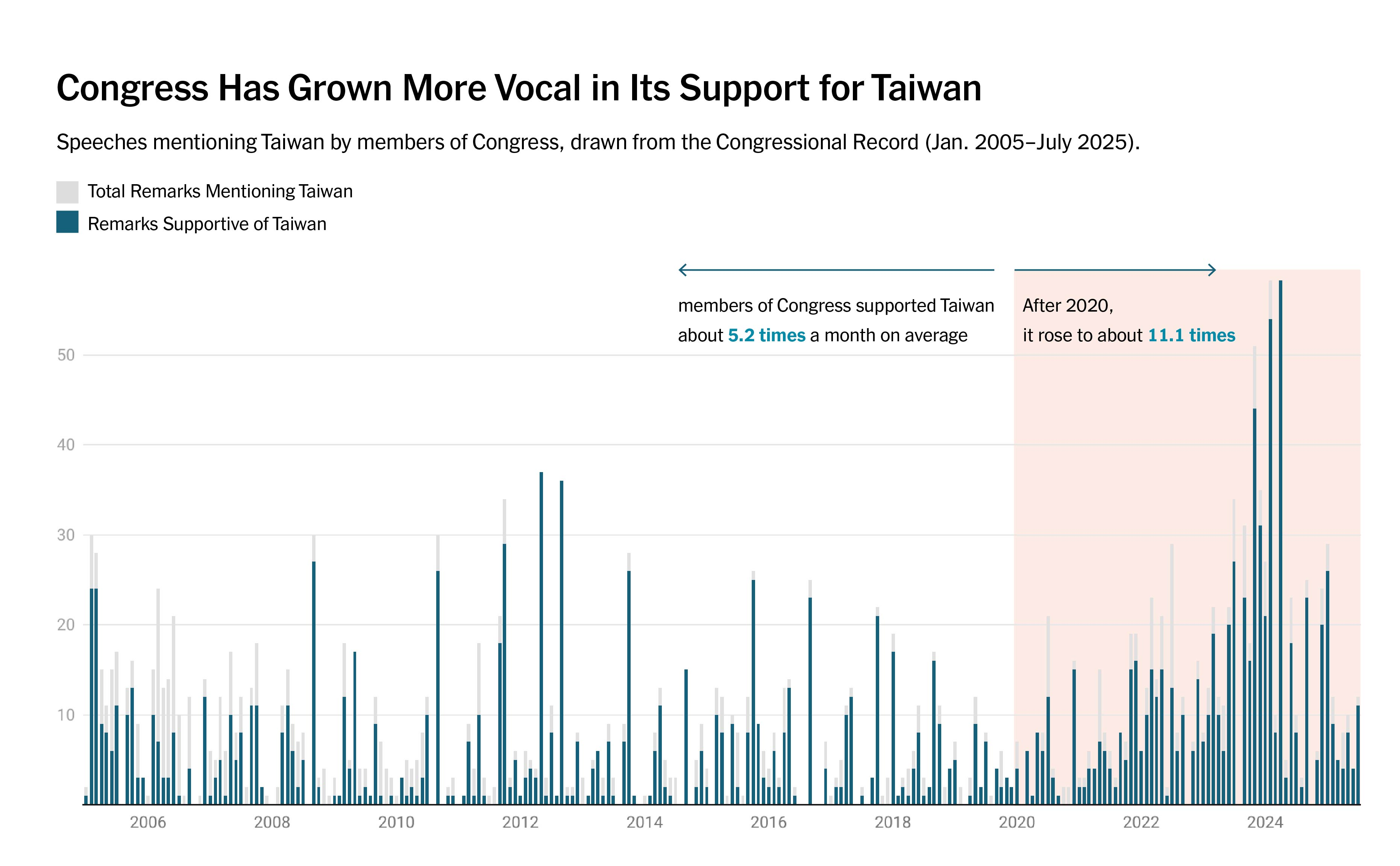
Since 2020, members of Congress have mentioned Taiwan about an average of 85.7 percent more frequently each month than they did between 2005 and 2019.
In speeches that mention Taiwan, the monthly average of those showing support has more than doubled, negative references to China have increased almost fourfold, and mentions of security have roughly tripled.
U.S. lawmakers now portray Taiwan as a democratic frontline resisting authoritarian expansion, frequently linking it with Ukraine and Israel. Since Russia’s invasion in 2022, 47 percent of speeches that have mentioned Taiwan have also referenced Ukraine.
The data shows that Taiwan remains a bipartisan issue, though Republicans have been more vocal: They delivered more than 1,300 speeches on the topic over the past two decades compared with about 920 for Democrats.
Even under the “America First” banner, the foreign-policy doctrine championed by President Donald Trump, which seeks a sharper focus on U.S. interests, Taiwan is gaining ground on the Hill. That’s driven by the belief among lawmakers of both parties that China is the United States’ biggest strategic threat. For many, Taiwan fits the “America First” narrative, which defends U.S. security interests.
“The balance of power in Asia is very important for the United States. And if Taiwan comes under the control of a hostile power, that’s a direct threat to the United States,” said Robert Sutter, a professor of international affairs at George Washington University who has long studied Congress’ role in China-U.S. policy.
Taiwan occupies a critical position in global trade, technology, and defense. According to the Center for Strategic and International Studies, about 20 percent of global maritime trade passes through the Taiwan Strait. Any disruption would threaten international commerce and the global semiconductor supply.
“If an armed conflict were to happen in Taiwan, the cost would be catastrophic,” said Richard J. Haddock, Taiwan specialist and assistant director of the Sigur Center for Asian Studies at George Washington University. Breaking the First Island Chain, he added, would let China project power deep into the Pacific, undermining U.S. and allied operations. “There’s the military dimension, the economic dimension and, finally, the fact that Taiwan is a democracy.”
Because the United States does not have official diplomatic ties with Taiwan, Congress has often taken the lead in maintaining the relationship – through high-profile visits, arms sales, and legislative efforts like supporting double taxation relief.
If China were to invade, the decision to send U.S. forces would fall to the president. But under the Constitution and the War Powers Act, Congress would have to approve any continued military involvement. It also plays a key role in approving arms sales and confirming any wartime ambassador to Taiwan.
How Congress views Taiwan matters – and recent trends show lawmakers paying closer attention and framing it more as a security and ideological priority in U.S. policy toward China.
Floor speeches don’t always lead to real action. As Sutter put it, “Sometimes it’s very meaningful and sometimes it’s a lot of show.” Even so, they offer a clear view of what Congress cares about, and how lawmakers frame Taiwan’s place in U.S. strategy.
This analysis examined every mention of Taiwan in the Congressional Record over the past 20 years, focusing on remarks made by lawmakers. Each speech was reviewed and categorized with the help of an AI tool and human review for its support for Taiwan, main topic, and any hostility toward China to track how congressional rhetoric has shifted over time.
Taiwan, Through the Words of Congress
In 1979, Congress passed the Taiwan Relations Act in response to the executive branch’s decision to establish formal diplomatic ties with the People’s Republic of China. The law remains the cornerstone of Taiwan-U.S. relations, committing the United States to support peace in the region and provide Taiwan with the means to defend itself. More recently, spikes in congressional attention followed in 1995, when lawmakers backed then-Taiwanese President Lee Teng-hui’s visit to Cornell University – an event that triggered the Third Taiwan Strait Crisis. It happened again in 2000, during the debate over whether to grant China Permanent Normal Trade Relations status, Taiwan was frequently invoked as a democratic counterpoint to Beijing.
Throughout much of the 2000s and 2010s – amid the War on Terror and other foreign policy priorities – China policy remained secondary.
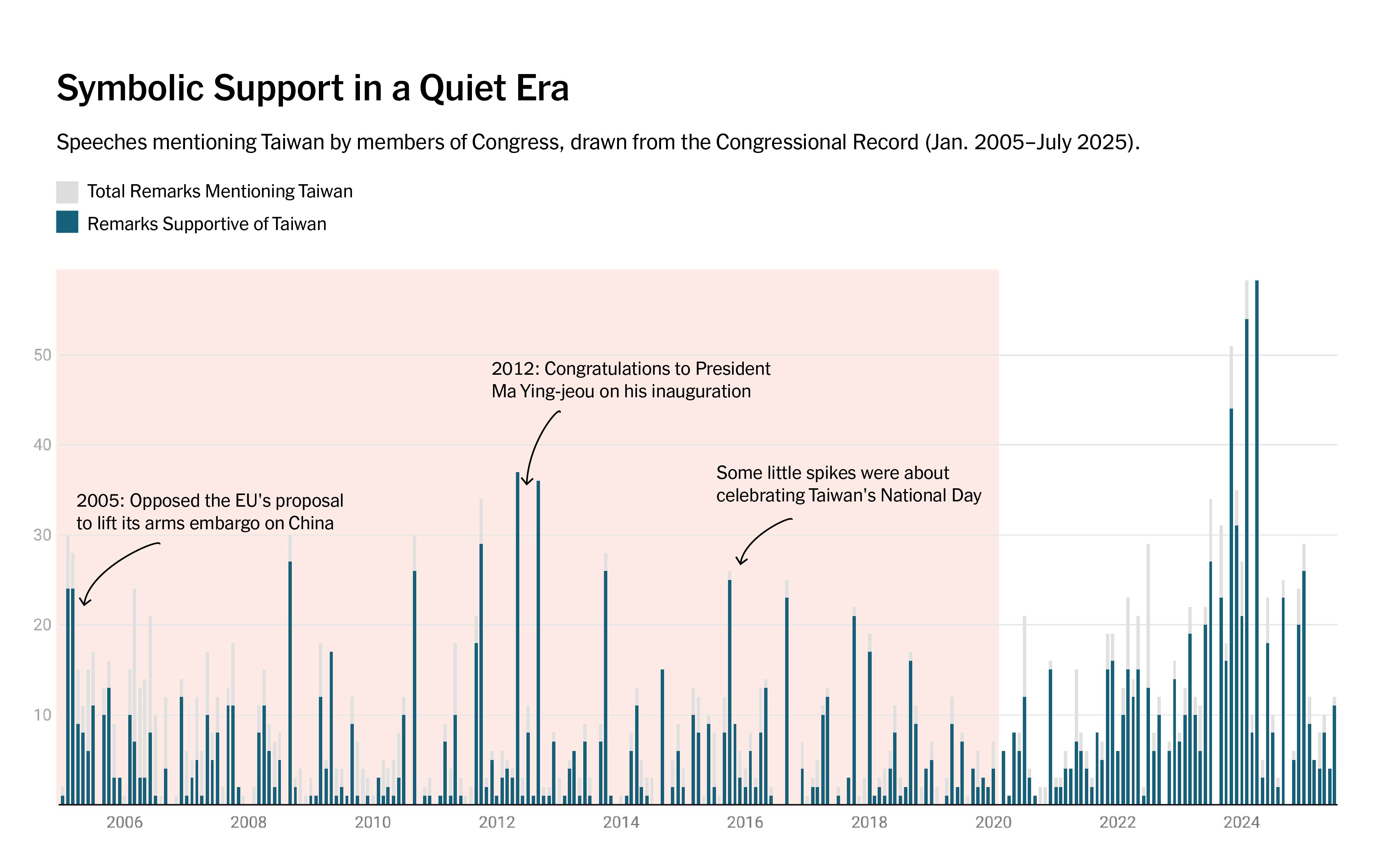
“Taiwan was not well known to the broad masses the way that it is now,” said Chiao-Yun Anny Hsiao, executive director of the Formosan Association for Public Affairs (FAPA), a grassroots advocacy group that works to shape U.S. Taiwan policy.
Reflecting on her early days lobbying in Washington a decade ago, she recalled: “We would really have to start by saying, ‘Do you know Taiwan is a democracy in the Pacific? It is a beacon of democracy and it stands for these values. We have bubble tea.’ We really had to introduce Taiwan to staffers.”
Things are very different in 2025. Taiwan is now on the map.
Over the past five years, lawmakers haven’t just shown more support for Taiwan – they’ve also increasingly talked about Taiwan in terms of security and voiced sharper hostility toward China.
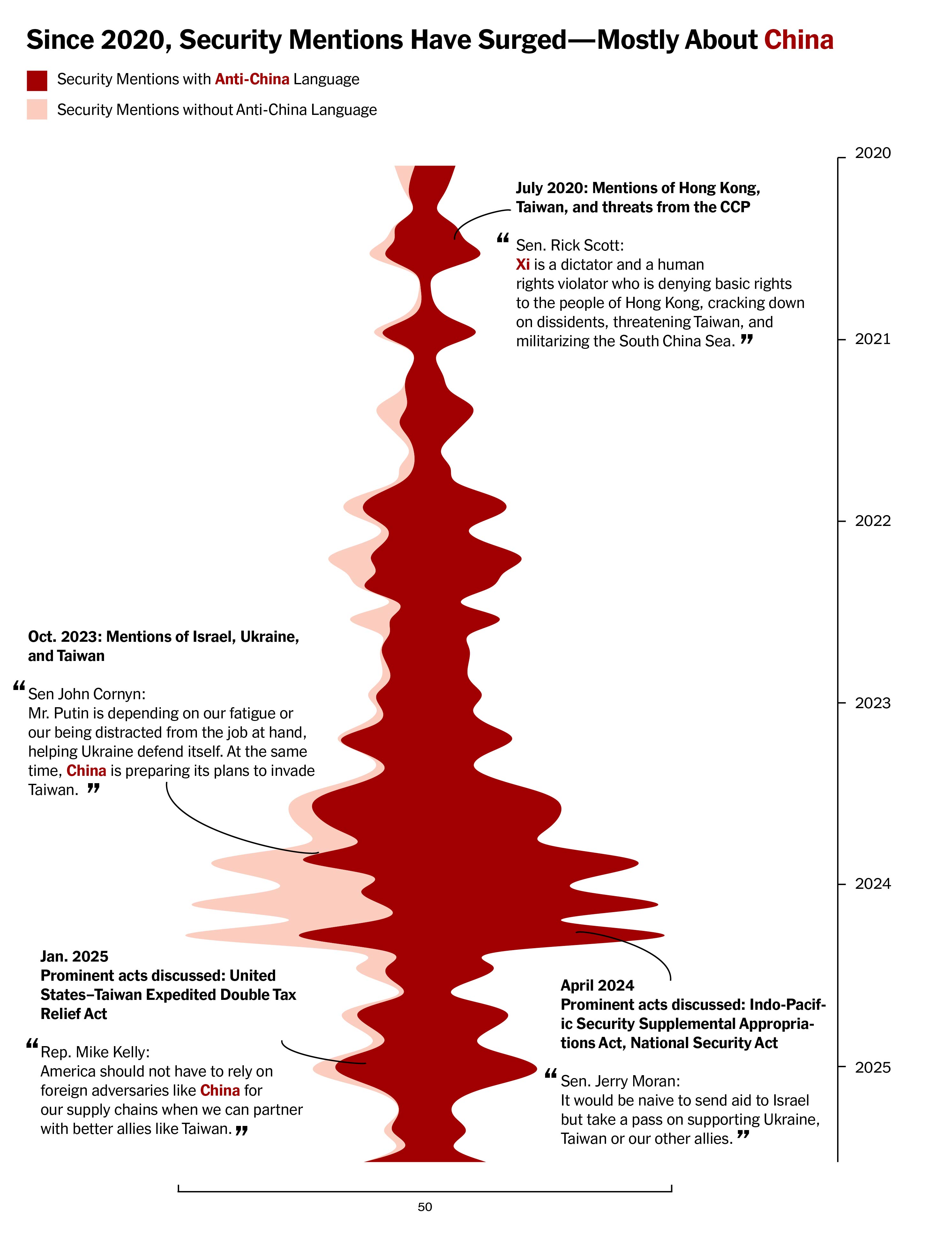
Sutter traced Congress’ hardening against China back to the Trump administration’s National Security Strategy during his first term, which “radically changed America’s China policy.” Bipartisan majorities backed the shift – and still do. Sutter marked 2017 and 2018 as the tipping point, when lawmakers began to see China’s actions as a serious challenge.
The rise in anti-China sentiment, Sutter explained, stems from growing alarm over Beijing’s actions, including cyberattacks and the 2023 incident involving a Chinese spy balloon that flew over the U.S. to gather intelligence.
David Bachman, chair of the China Studies Program at the University of Washington, noted that the Biden administration made clear its rivalry with China and its intent to compete with Beijing in security and the economy. Through the Inflation Reduction Act and the CHIPS and Science Act, Bachman said, the Biden administration has sought to encourage Taiwanese investment in the United States, particularly from chipmaker TSMC.
“This was also the period when China signed its ‘friendship without limits’ agreement with Russia on the eve of the invasion of Ukraine,” he added. “To the extent that China and Russia are seen as aligned, that makes it easier to criticize China and contrast Taiwan with the PRC.”
When discussing China and Taiwan, lawmakers have positioned Taiwan within a broader global divide, casting it alongside other democracies in contrast to authoritarian regimes.
In one floor speech, Sen. John Cornyn (R-TX) said, “China is financing the Russian war while America is supporting Ukraine. China is propping up the Iranian regime and terrorist proxies while the United States is backing Israel’s righteous defense. China is threatening its own invasion of Taiwan while the United States stands firmly in support of Taiwan’s defense.”
It was one of many speeches in which members of Congress drew sharp contrasts between democratic allies and authoritarian regimes.
The most common pairing in these remarks was the mention of both security and democracy, which appeared in about 21 percent of all speeches.
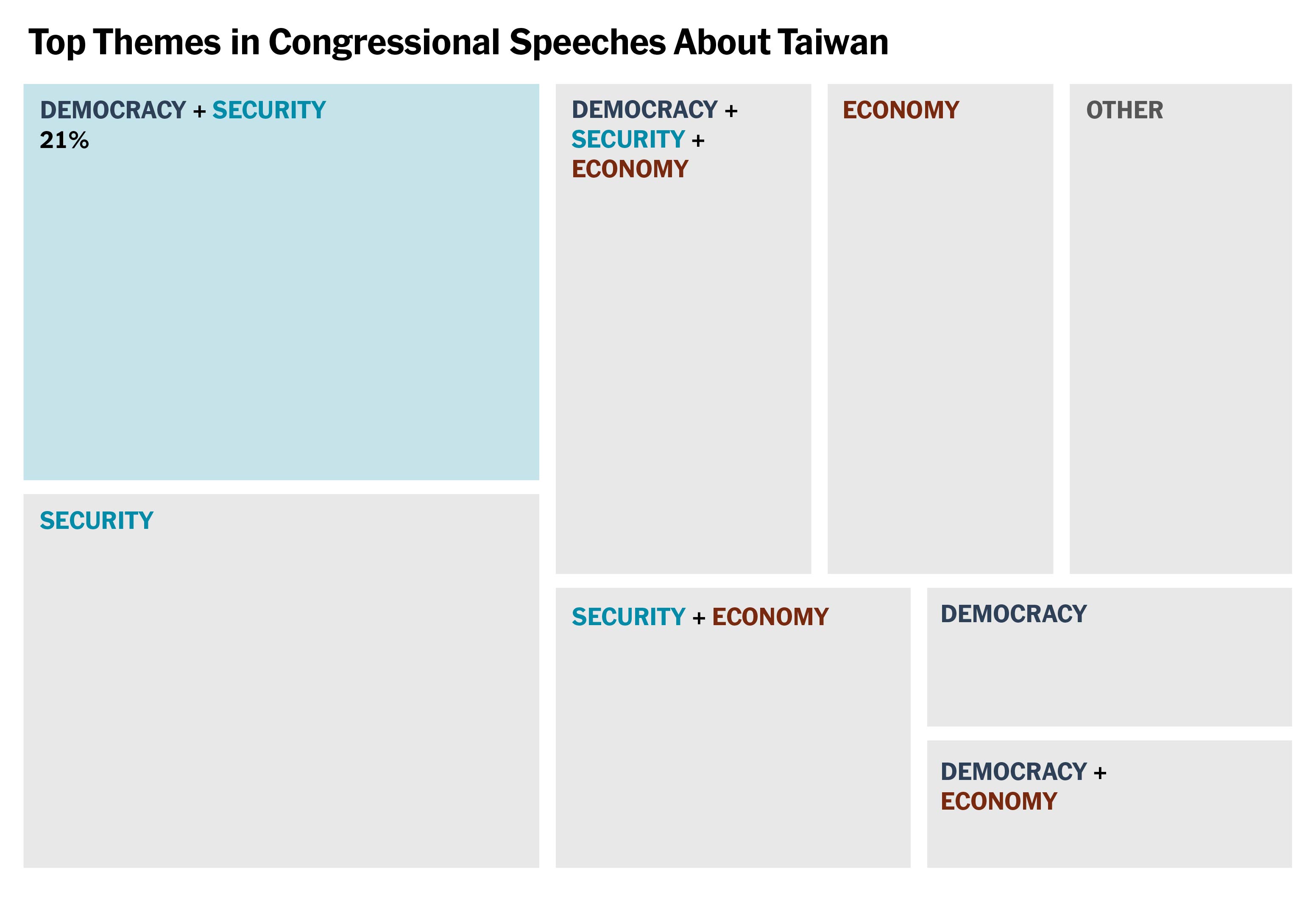
Among democratic allies of the U.S., Ukraine is referenced most frequently in congressional speeches. But in recent years, lawmakers have also cast Taiwan as part of the democratic front line.
Ideological alignment alone is no guarantee of unwavering U.S. support – especially in today’s foreign policy landscape. Trump has repeatedly changed his mind toward autocratic regimes. His shifting stance on Russian President Vladimir Putin and wavering support for Ukraine raise questions about whether Congress would view Taiwan differently.
While many Republican lawmakers may have reluctantly gone along with Trump’s approach to Ukraine, Sutter said Taiwan is fundamentally different: “The support is too widespread, it’s too deep. The sense of danger coming from China is very strong.”
That’s a key difference between China and Russia, he explained: “Nobody [in the U.S.] fears being dominated by Putin, but the members of Congress do not want to be dominated by China.”
If Trump were to attempt to roll back U.S. support for Taiwan, Sutter believes “there would be resistance even in the Republican Party,” adding, “and I think Trump understands that.”
Taiwan’s Allies on the Hill
According to the data, lawmakers in both parties have expressed support for Taiwan, though Republicans have been more vocal.
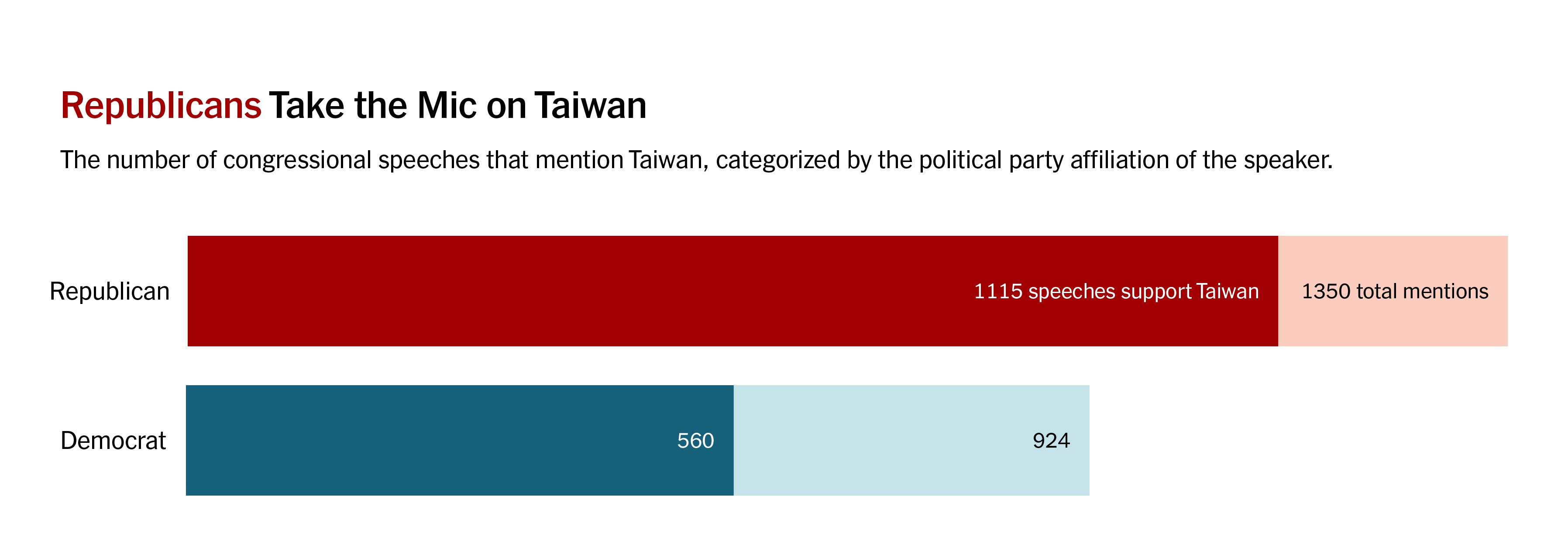
Different parties respond to slightly different appeals. Hsiao said Republican lawmakers are generally more responsive to arguments centered on national security and U.S. strategic interests in the Indo-Pacific. With Democrats, FAPA emphasizes shared democratic values and alliance-building – pointing to initiatives like the Global Cooperation and Training Framework and advocating for Taiwan’s participation in international organizations such as the World Health Organization during the height of the pandemic.
One of the most outspoken voices for Taiwan was former Rep. Ileana Ros-Lehtinen (R-FL), who retired from Congress in 2019. For her, the cause was also personal.
Having fled Castro’s regime as a child, Ros-Lehtinen brought a deep personal connection to the fight for democracy. In Congress, she became one of Taiwan’s staunchest allies. “I admire Taiwan’s successful evolution from an authoritarian regime to now a thriving democracy,” she said.
Her personal background shaped her commitment to Taiwan, and she led multiple congressional delegations to the island. In recognition of her efforts, she was honored by Taiwan’s former President Tsai Ing-wen.
Lawmakers across party lines and in both chambers shared her stance. Among the most vocal supporters were Sen. Cornyn, Sen. Mitch McConnell (R-KY), Rep. Joe Wilson (R-SC), Sen. Dan Sullivan (R-AK), and former Rep. Ros-Lehtinen.
In more recent years, Cornyn, McConnell, Sullivan, and Wilson have remained vocal. Lawmakers such as Sen. Blackburn and Senate Majority Leader John Thune (R-SD) have also become increasingly outspoken on Taiwan.
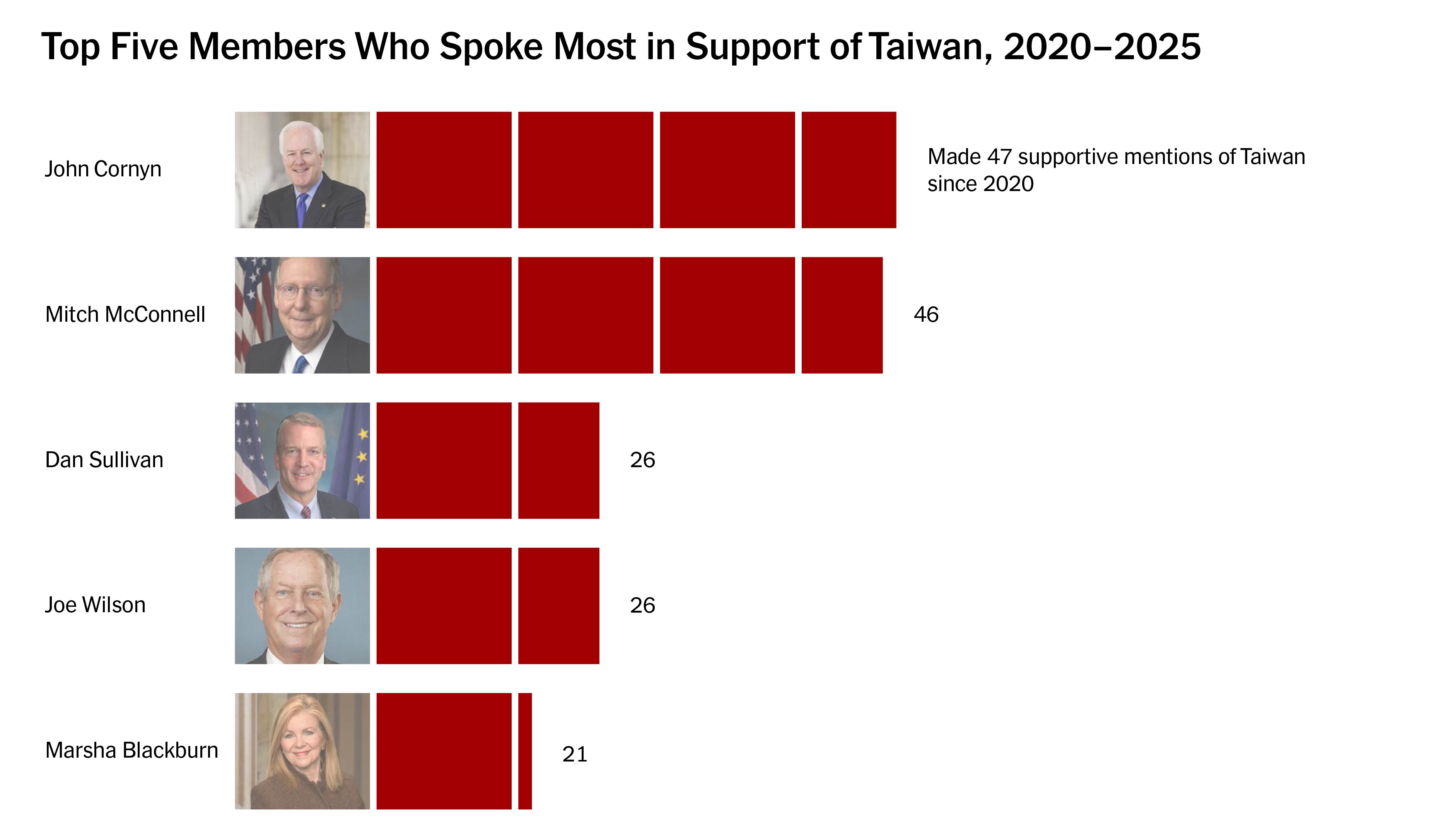
“There are people who are sincerely supportive of Taiwan – for values, for some economic reasons,” said Bachman.
“But it is also a convenient way by which Congress can show its criticism of China and show some sort of alternative to authoritarian China,” he added.
Much of the support for Taiwan is associated with anti-China sentiment – and that sentiment is growing.
The Faces Behind Congressional Support for Taiwan
Among the most consistent voices supporting Taiwan is FAPA – the leading Taiwan advocacy group on Capitol Hill.
“Our model of change is to make sure that we continue to build relationships with members of Congress,” said Hsiao. “To cultivate that support not just for them to say they’re supportive but also take action and propose legislation that will enhance and bring closer U.S.-Taiwan relations.”
FAPA envisions a future in which Taiwan achieves full international recognition of its sovereignty. In the meantime, the organization is focused on normalizing relations through military and economic cooperation, legislation and people-to-people exchange.
Even when legislation doesn’t pass, congressional action can still have an impact.
Hsiao pointed to the recent double taxation relief bill that aims to ease tax burdens on Taiwanese individuals and companies earning income in the U.S. Though it has yet to pass, she said, the momentum it gained – earning co-sponsors and clearing one chamber – helped push the executive branch to act in the 118th Congress.
In October 2024, the U.S. Treasury announced it had opened talks with Taiwan on the issue and acknowledged the problem of double taxation in a public statement.
“There’s other reasons why the U.S. might act,” Hsiao said, “but there is a whole body of hundreds of lawmakers putting pressure on the executive branch.”
Voices From the Island
Tensions across the Taiwan Strait matter to the United States. But it is the Taiwanese people who must brace for impact.
How the Taiwanese public perceives U.S. support is critical – not just for morale, but for resisting Beijing’s psychological warfare.
“American skepticism is the sentiment that China wants to sow in the Taiwanese public,” said Hsiao. “Because the less confidence you have that America is going to be supportive, then the easier it is for the general population of Taiwan to think that there’s no other option but to make peace with China.”
Hsiao believes stronger action from U.S. lawmakers could offer proof that the United States will stand by Taiwan and help counter Beijing’s disinformation campaigns.
Wen Liu, a Taiwanese scholar and civil defense advocate, said it is difficult to measure whether trust in the United States has grown or declined, but high-level visits by U.S. officials – including from Congress – have made a difference.
“Pelosi’s visit in 2022 was a significant increase in the population’s trust in the U.S. government because that was the highest official who has visited Taiwan,” Liu said.
“The smaller things, like visits or unofficial exchanges – all that has been building up more trust,” she added. “And this time in Taiwan’s Han Kuang military exercise, there is more Taiwan and U.S. unofficial collaborations, such as ex-military officers acting as expert observers. Those things will definitely, I think, add up to Taiwanese trust.”
There are areas where the U.S. may appear tougher on Taiwan – such as the executive branch pushing for tariff negotiations and greater access to Taiwan’s agricultural market for U.S. exports.
“There are some times when it might seem like things are a little bit more tense,” said Chieh-Ting Yeh, director of U.S. Taiwan Watch, a think tank on Taiwan-U.S. relations. “But that doesn’t mean we’re not friends.”
He added, “We’re in the phase of the relationship now where there are going to be real stakes involved. And just the nature of that is there’s some give and take.”
Both Liu and Yeh cautioned Taiwanese people not to get caught up in day-to-day shifts from Trump or other officials, but, as Liu put it, “to trust the grand vision that the U.S. cannot sacrifice Taiwan.”













